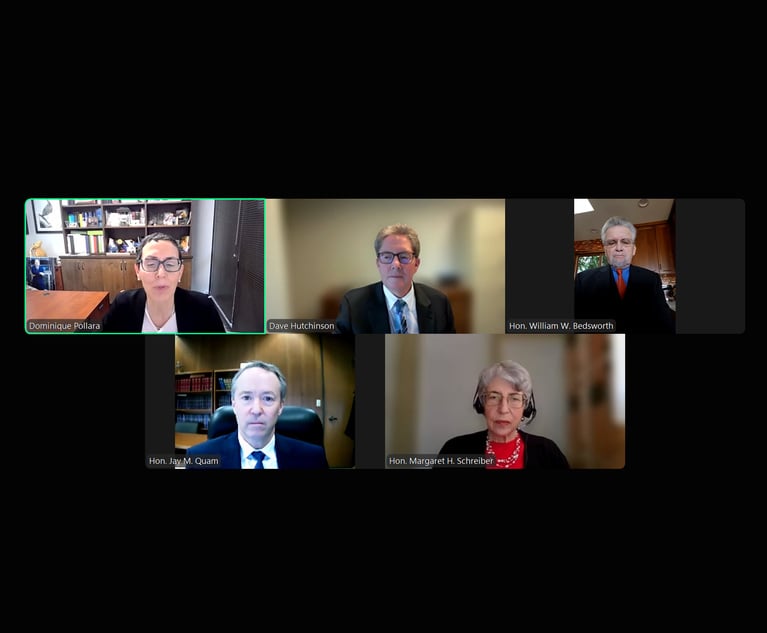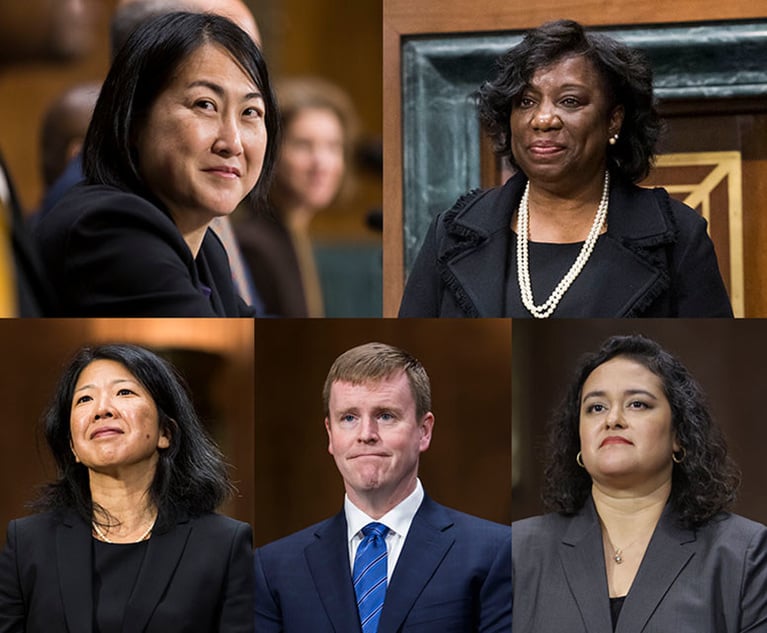 Partner Tyler A. Young and associate Emily Bodtke Zambrana, Faegre Drinker associate (Photo: Courtesy Photo)
Partner Tyler A. Young and associate Emily Bodtke Zambrana, Faegre Drinker associate (Photo: Courtesy Photo)Consumer Surveys at the Complaint Stage: The Latest Tactic in Consumer Class Actions
The better reasoned cases recognize that consumer survey allegations do not drive the analysis on a motion to dismiss.
April 30, 2020 at 01:30 PM
11 minute read
Courts are growing increasingly skeptical of class actions challenging the labeling and advertising of food, beverage, and other consumer products. In the past few years, numerous courts have dismissed complaints because a reasonable consumer would not interpret the challenged statement in the way the plaintiff alleges. In an attempt to survive this more robust reasonable-consumer standard, many plaintiffs' lawyers have begun including consumer survey allegations in their complaints. The legal significance of these allegations—which are often barebones—is a developing question of law with significant implications for practitioners.
|An Emerging Tactic: Consumer Surveys at the Pleading Stage
Consumer surveys have long been an important part of consumer fraud class actions, but traditionally they have not been a significant point of contention until the expert discovery stage. At that point, litigants often enlist an expert to design a survey that explores: (1) consumer interpretation, and (2) materiality.
But recently, plaintiffs' lawyers have been deploying the consumer survey much earlier—in the complaint itself—to support deceptive labeling claims. This tactic attempts to bolster the plausibility of allegations that the challenged label statement would deceive a reasonable consumer.
Take, for example, the complaint in Naimi v. Starbucks, No. 2:17-cv-06484, Dkt. 31 (C.D. Cal.), where the plaintiffs claimed that they were deceived into believing that canned "Starbucks Doubleshot® Espresso" products contained two shots of Starbucks Espresso Roast. After the court dismissed without prejudice, the plaintiffs amended to add the following allegation:
A recent national survey conducted among a demographically representative U.S. sample of over 400 consumers of the Product demonstrated that based on the name and complete label of the Product, over 89% of those consumers believe that the Product contains two shots of Starbucks brand espresso. The survey was conducted by an independent market research company.
The plaintiffs did not attach a copy of the survey, and they did not provide any information about how it was conducted.
Several recent class action complaints have included survey allegations mirroring the Naimi complaint's: They allege that a consumer survey of over 400 consumers showed that a majority believed that the packaging conveyed the allegedly deceiving message. These complaints do not attach the survey itself, and they typically do not identify who commissioned the survey, who conducted the survey, what questions were asked, whether the responses were open-ended or closed-ended, what packaging (if any) was shown to the participants, or any other details.[1]
The immediate goal of this emerging tactic is to survive a motion to dismiss. Indeed, the tactic most often appears in amendments to complaints that were already dismissed once, without prejudice, in order to avoid a with-prejudice dismissal.
|Does This Tactic Work? The Case Law Is Divided
The case law addressing the effect of this kind of survey allegations is slim, and the case law that does exist is sharply divided. The Ninth Circuit recently issued two opinions (one published, one unpublished) within days of each other that reached opposite outcomes on the issue.
In the first, unpublished opinion, the Ninth Circuit addressed the Naimi v. Starbucks complaint quoted above. The district court dismissed the complaint and refused to "accept the truth of the single allegation concerning the survey," because it lacked "factual detail" such as how the survey was conducted, what questions it contained, or how the market research company arrived at its conclusion. 2018 U.S. Dist. LEXIS 110398, at *12-13 (C.D. Cal. June 27, 2018). On appeal, the Ninth Circuit reversed. "Contrary to the district court's conclusion," the Ninth Circuit explained, "Plaintiffs were not required to allege additional details concerning the contents and reliability of the survey in order for the survey's results to be credited as true at the motion-to-dismiss stage." 798 Fed. Appx. 67, 69 (9th Cir. Dec. 20, 2019).
A second, published Ninth Circuit opinion issued 10 days later, Becerra v. Dr Pepper/Seven Up, addressed a complaint alleging that the label "diet" on Diet Dr. Pepper falsely promised consumers that the product would "assist in weight loss" or at least "not cause weight gain." The complaint cited a survey of 400 consumers, where 12.5% expected diet soft drinks to help them lose weight and 63.3% expected diet soft drinks to help them maintain weight. The district court found that these survey allegations could not state a claim in the absence of "other plausible allegations supporting a reasonable inference that Diet Dr Pepper is misleading" and dismissed the complaint. 2018 WL 3995832, at *6-7 (N.D. Cal. Aug. 21, 2018). On appeal, the Ninth Circuit affirmed, agreeing that the consumer survey allegations failed to "salvage [plaintiff]'s claim." 945 F.3d 1225, 1231 (9th Cir. 2019).
So, which Ninth Circuit panel was correct: Naimi or Becerra? Arguably, the two opinions are not conflicting. The Becerra court found that, even accepting the survey allegations as true, they could not salvage an implausible claim. The Naimi panel, on the other hand, first found that the plaintiffs pled a plausible deception claim based on the challenged "Doubleshot" label itself, and only then observed that the survey allegations provided additional support. To the extent the decisions are in tension, Becerra is published, while Naimi is not, so Becerra will carry the precedential weight in the Ninth Circuit. See Ninth Circuit Rule 36-3(a) ("Unpublished dispositions and orders of this Court are not precedent ….").
Courts across the country are similarly divided on this issue. Some courts have held that survey allegations standing alone are insufficient to support a plausible deception claim.[2] Others have held that such allegations state a plausible deception claim and prevent dismissal.[3]
|Consumer Surveys Cannot Salvage a Deficient Claim
The case law addressing this specific question is still developing. But the better reasoned cases recognize that consumer survey allegations do not drive the analysis on a motion to dismiss. This is true for five reasons that are drawn from other well-established legal principles.
The first is that "[t]he primary evidence in a false advertising case is the advertising itself." Williams v. Gerber Prod. Co., 552 F.3d 934, 938 (9th Cir. 2008); see also Fink v. Time Warner Cable, 714 F.3d 739, 742 (2d Cir. 2013). Thus, if a claim of deceptive labeling or advertising is plausible based on the labeling or advertising itself, a consumer survey adds nothing, because it can already survive a motion to dismiss. If, on the other hand, the labeling or advertising itself makes a claim implausible, allegations that a survey showed that a significant portion of respondents were deceived should not change the analysis.
Second, the "reasonable consumer" is an objective standard. Thus, claims may be dismissed "as a matter of law" where an alleged statement is such that no reasonable consumer could be misled in the manner claimed. Broomfield v. Craft Brew All., 2017 WL 3838453, at *5 (N.D. Cal. Sept. 1, 2017) (citing Haskell v. Time, Inc., 857 F.Supp. 1392, 1399 (E.D. Cal. 1994)); see also In re 100% Grated Parmesan, 348 F. Supp. 3d at 805. The fact that some number of unidentified survey respondents answering undisclosed questions subjectively interpreted a challenged label statement a certain way cannot change what an objectively reasonable consumer would believe. See Elbaz v. Vitals Int'l Group, 2018 WL 5868739 (C.D. Cal. Apr. 10, 2018) ("[A]llegations regarding a consumer survey could not overcome the Court's conclusion that, as a matter of law, a shampoo that contains 100% natural preservative ingredients is not misleading when its label states that it has a '100% Natural Preservative System.'").
Third, whether a "reasonable consumer" would be deceived does not hinge on the overall proportion of people that would be confused by a challenged label statement. Rather, it hinges on whether a reasonable consumer, acting reasonably in the circumstances, would be misled. See Fink, 714 F.3d at 741; see also Ebner v. Fresh, Inc., 838 F.3d 958, 966 (9th Cir. 2016) (quoting Lavie v. Procter & Gamble Co., 129 Cal.Rptr.2d 486, 495 (2003)).The fact that 50% of people surveyed interpret a label to convey a certain message does not make that interpretation reasonable, nor does it make it plausible that a reasonable consumer viewing the same message would be confused or misled. As the district court in Becerra observed, survey results may "signify a possible consumer view but not a plausible one." 2018 WL 3995832, at *7.
Fourth, even accepted as true, survey allegations may not actually support the plaintiff's allegations. Under Twombly, it is not sufficient that the survey results are "merely consistent with" the plaintiff's theory; rather, they must "plausibly suggest" that the plaintiff's theory is true as opposed to equally probable or more probable theories. 550 U.S. 544, 557 (2007). That is the primary reason the Becerra survey allegations fell flat. While 63.3% of those surveyed expected diet soft drinks to help them maintain weight—which is how the plaintiff alleged consumers understood the term "diet"—those results were not inconsistent with the more reasonable understanding of "diet" "as a relative claim about the calorie or sugar content of the product" compared to the non-diet version. 945 F.3d at 1231. Because the survey results could not exclude that more reasonable interpretation, they failed to salvage the plaintiff's alternative, implausible interpretation. Other courts have reached similar conclusions. See Axon v. Citrus World, 2019 WL 8223527, at *2 (E.D.N.Y. Jan. 14, 2019).
Finally, even assuming courts must accept survey allegations as true at the motion to dismiss stage, if plaintiffs omit crucial information about the survey, that affects whether the survey allegations nudge the "claims over the line from conceivable to plausible." Twombly, 550 U.S. at 570. For example, many courts hold that "context is crucial" in assessing consumer deception claims. Fink, 714 F.3d at 741; In re 100% Grated Parmesan, 348 F. Supp. 3d at 805. If a plaintiff fails to specify whether its survey showed the entire "context" of a challenged statement, the survey allegations cannot make the deception claim any more plausible.
|Conclusion
Consumer survey allegations should not drive the analysis at the motion to dismiss stage. Instead, courts should decide whether a challenged statement is objectively misleading to a reasonable consumer based on the challenged material itself. If it is not, no amount of consumer survey allegations can undo the conclusion that a reasonable consumer would not be deceived.
[1] See, e.g., Tucker v. Post Consumer Brands, No. 2:19-cv-03993 (N.D. Cal.), First Amended Complaint, Dkt. 20 ¶¶ 25, 29; Joseph v. JM Smucker Co., No. 2:17-cv-0735 (C.D. Cal.), First Amended Complaint, Dkt. 35 ¶¶ 3, 32; Becerra v. Dr Pepper/Seven Up, No. 3:17-cv-05921 (N.D. Cal.), Third Amended Complaint, Dkt. 60 ¶ 42.
[2] Geffner v. Coca-Cola Co., 343 F. Supp. 3d 246 (S.D.N.Y. 2018), aff'd, 928 F.3d 198 (2d Cir. 2019); In re 100% Grated Parmesan Cheese Mktg. & Sales Practices Litig., 348 F. Supp. 3d 797 (N.D. Ill. 2018); Elbaz v. Vitals Int'l Group, 2018 WL 5868739 (C.D. Cal. Apr. 10, 2018); Podpeskar v. Dannon Co., 2017 WL 6001845 (S.D.N.Y. Dec. 3, 2017).
[3] Joseph v. JM Smucker Co., 2019 WL 1219708 (C.D. Cal. Mar. 13, 2019); Organic Consumers Ass'n v. Sanderson Farms, 284 F. Supp. 3d 1005 (N.D. Cal. 2018); Shalikar v. Asahi Beer U.S.A., 2017 WL 9362139 (C.D. Cal. Oct. 16, 2017); Branca v. Nordstrom, 2015 WL 10436858 (S.D. Cal. Oct. 9, 2015); Hemy v. Perdue Farms, 2013 WL 1338199 (D.N.J. Mar. 31, 2013).
Tyler A. Young is a partner at Faegre Drinker and a co-leader of the firm's Food Class Action Team. He focuses on complex class action defense and litigation for food, beverage, and dietary supplement companies. Emily Bodtke Zambrana is an associate at Faegre Drinker. She defends food and agribusiness companies and medical device manufacturers in litigation. As a member of the firm's nationally ranked product liability practice, Emily represents clients in a wide variety of litigation matters, including consumer fraud class actions, toxic tort, personal injury, and contract disputes. The authors represent Post Consumer Brands, LLC in Tucker v. Post Consumer Brands, LLC, No. 2:19-cv-03993 (N.D. Cal.). The case in that complaint includes consumer survey allegations similar to those discussed in this article.
This content has been archived. It is available through our partners, LexisNexis® and Bloomberg Law.
To view this content, please continue to their sites.
Not a Lexis Subscriber?
Subscribe Now
Not a Bloomberg Law Subscriber?
Subscribe Now
NOT FOR REPRINT
© 2024 ALM Global, LLC, All Rights Reserved. Request academic re-use from www.copyright.com. All other uses, submit a request to [email protected]. For more information visit Asset & Logo Licensing.
You Might Like
View All
'Serious Disruptions'?: Federal Courts Brace for Government Shutdown Threat
3 minute read
‘It's Your Funeral’: On Avoiding Damaging Your Client’s Case With Uncivil Behavior

Practice Tips From—and About—the New Judges on the Northern District of California Bench

Trending Stories
- 1Call for Nominations: Elite Trial Lawyers 2025
- 2Senate Judiciary Dems Release Report on Supreme Court Ethics
- 3Senate Confirms Last 2 of Biden's California Judicial Nominees
- 4Morrison & Foerster Doles Out Year-End and Special Bonuses, Raises Base Compensation for Associates
- 5Tom Girardi to Surrender to Federal Authorities on Jan. 7
Who Got The Work
Michael G. Bongiorno, Andrew Scott Dulberg and Elizabeth E. Driscoll from Wilmer Cutler Pickering Hale and Dorr have stepped in to represent Symbotic Inc., an A.I.-enabled technology platform that focuses on increasing supply chain efficiency, and other defendants in a pending shareholder derivative lawsuit. The case, filed Oct. 2 in Massachusetts District Court by the Brown Law Firm on behalf of Stephen Austen, accuses certain officers and directors of misleading investors in regard to Symbotic's potential for margin growth by failing to disclose that the company was not equipped to timely deploy its systems or manage expenses through project delays. The case, assigned to U.S. District Judge Nathaniel M. Gorton, is 1:24-cv-12522, Austen v. Cohen et al.
Who Got The Work
Edmund Polubinski and Marie Killmond of Davis Polk & Wardwell have entered appearances for data platform software development company MongoDB and other defendants in a pending shareholder derivative lawsuit. The action, filed Oct. 7 in New York Southern District Court by the Brown Law Firm, accuses the company's directors and/or officers of falsely expressing confidence in the company’s restructuring of its sales incentive plan and downplaying the severity of decreases in its upfront commitments. The case is 1:24-cv-07594, Roy v. Ittycheria et al.
Who Got The Work
Amy O. Bruchs and Kurt F. Ellison of Michael Best & Friedrich have entered appearances for Epic Systems Corp. in a pending employment discrimination lawsuit. The suit was filed Sept. 7 in Wisconsin Western District Court by Levine Eisberner LLC and Siri & Glimstad on behalf of a project manager who claims that he was wrongfully terminated after applying for a religious exemption to the defendant's COVID-19 vaccine mandate. The case, assigned to U.S. Magistrate Judge Anita Marie Boor, is 3:24-cv-00630, Secker, Nathan v. Epic Systems Corporation.
Who Got The Work
David X. Sullivan, Thomas J. Finn and Gregory A. Hall from McCarter & English have entered appearances for Sunrun Installation Services in a pending civil rights lawsuit. The complaint was filed Sept. 4 in Connecticut District Court by attorney Robert M. Berke on behalf of former employee George Edward Steins, who was arrested and charged with employing an unregistered home improvement salesperson. The complaint alleges that had Sunrun informed the Connecticut Department of Consumer Protection that the plaintiff's employment had ended in 2017 and that he no longer held Sunrun's home improvement contractor license, he would not have been hit with charges, which were dismissed in May 2024. The case, assigned to U.S. District Judge Jeffrey A. Meyer, is 3:24-cv-01423, Steins v. Sunrun, Inc. et al.
Who Got The Work
Greenberg Traurig shareholder Joshua L. Raskin has entered an appearance for boohoo.com UK Ltd. in a pending patent infringement lawsuit. The suit, filed Sept. 3 in Texas Eastern District Court by Rozier Hardt McDonough on behalf of Alto Dynamics, asserts five patents related to an online shopping platform. The case, assigned to U.S. District Judge Rodney Gilstrap, is 2:24-cv-00719, Alto Dynamics, LLC v. boohoo.com UK Limited.
Featured Firms
Law Offices of Gary Martin Hays & Associates, P.C.
(470) 294-1674
Law Offices of Mark E. Salomone
(857) 444-6468
Smith & Hassler
(713) 739-1250






